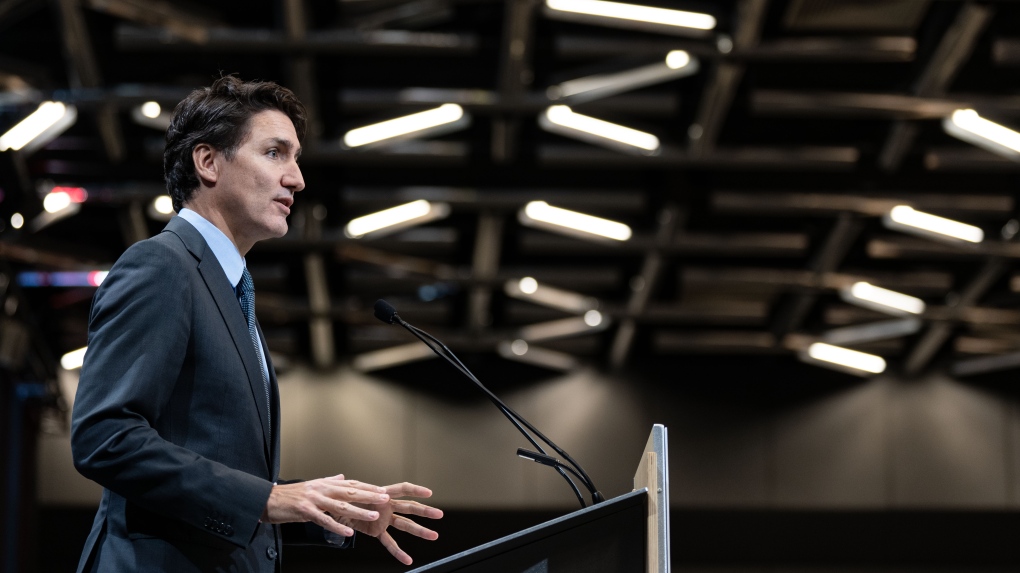Trudeau Calls for Premiers’ Meeting Amid Trump’s Proposed Tariff Threat

Prime Minister Justin Trudeau is convening a meeting of Canada’s provincial and territorial leaders this week to discuss U.S. President-elect Donald Trump’s threat to impose a 25 percent tariff on Canadian and Mexican goods. The tariff would take effect on Trump’s first day in office, contingent on border issues being addressed.
Trudeau emphasized the importance of unity in responding to this threat, stating that a “Team Canada” approach is vital to navigating the situation. The meeting, which will take place virtually on Wednesday at 5 p.m. EST, aims to create a coordinated strategy among all levels of government.
The proposed tariffs come on the heels of a letter from Canada’s premiers to Trudeau, urging an urgent meeting before Trump assumes office. Trudeau spoke with several premiers, including Ontario’s Doug Ford and Quebec’s François Legault, ahead of the meeting, agreeing on the need for a unified approach in dealing with the looming trade challenge.
Ford, who chairs the Council of the Federation, called Trump’s move to treat Canada and Mexico the same as unfair and insulting, likening it to a betrayal by a family member. He expressed hope that the premiers’ meeting will prevent the need for Canada to retaliate.
Since Trump’s tariff warning, political leaders from all parties and various stakeholders have voiced their concerns over the potential economic impacts. Official Opposition Leader Pierre Poilievre criticized Trump’s threat as “unjustified” but also took aim at the Liberal government for downplaying the risks following Trump’s election win.
While Trudeau reached out to Trump directly on Monday night, describing the conversation as constructive, both Deputy Prime Minister Chrystia Freeland and Public Safety Minister Dominic LeBlanc reaffirmed Canada’s commitment to securing the border in collaboration with the U.S. However, they stopped short of confirming if Canada would retaliate.
Freeland and LeBlanc were also joined by Foreign Affairs Minister Mélanie Joly and Industry Minister François-Philippe Champagne, both of whom stressed the importance of maintaining strong diplomatic relations and preparing for any challenges that may arise.
Energy and Natural Resources Minister Jonathan Wilkinson pointed out the deep interdependence between the two nations, particularly in energy, which includes significant oil, gas, and hydroelectric exchanges.
The escalating tariff threat is already a central issue in Canada’s political discourse, with the House of Commons set to hold an emergency debate on the matter. Poilievre has argued that the economic implications of such tariffs could be disastrous, particularly for industries reliant on U.S. exports.
Trump’s threat, posted on social media, stated that he would sign an executive order imposing a 25 percent tariff on all goods from Canada and Mexico on January 20, unless the two countries address issues related to illegal immigration and drug trafficking. The border issue has been a point of contention in U.S.-Canada relations, with data showing a much lower number of migrant crossings from Canada compared to Mexico.
As the situation continues to develop, Canada is considering several measures to address Trump’s tariff threat, with leaders working together to find a solution that avoids economic fallout. The proposed tariffs could push the Canadian economy toward recession, according to experts, and spark a potential trade war between the U.S. and Canada.
Canadian businesses and economists, including the Canadian Chamber of Commerce, have warned of the significant long-term economic costs, estimating that retaliatory tariffs could cost billions annually. The possibility of an economic slowdown due to higher tariffs is now a major concern for both sides of the border.
While the situation remains fluid, the Trudeau government’s response will likely shape the future of Canada-U.S. relations as both countries face new economic and political challenges under the incoming U.S. administration.
